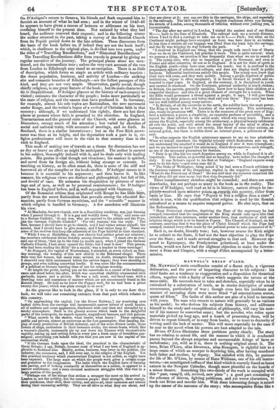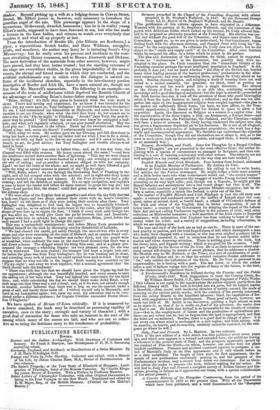MAXWELL'S BRIAN O'LINN.
Ma. MAXWELL'S main excellencies consist of a fluent style, a vigorous delineation, and the power of imparting character to his subjects : his chief faults are a tendency to exaggeration and a disposition for theatrical effects, together with a laxity of tone which suggests the tavern or the mess-table. He succeeds best in tales and sketches, especially when he is restrained by a substratum of truth, as in stories descriptive of actual occurrences, particularly of war ; though even here his incidents and manner of narrating them were more fitted "ad ostentationem scent; quam ad fidem." The faults of this author are also of a kind to increase with years. The man who resorts to nature will generally be as various as his model; he who derives his subjects from history, and addresses himself to the study and exemplification of philosophy, will vary his mat- ter if his manner be somewhat same; but the novelist who relies upon materials picked up long ago, and a knack of presenting them, will be driven to repeat himself, or to copy from books, or to trust to dexterity of writing amid the lack of matter. This will more especially be the case if he soar to the novel when his powers are best adapted to the tale.
Brian O'Linn illustrates these positions pretty clearly. The story has no relation to actual life, and the manner in which it is conducted passes beyond the abrupt surprises and unreasonable doings of farce or melodrama; yet, wild as it is, there is nothing original about it. The hero, Brian O'Linn, alias Deverenx, alias Hunsgate, is rightful heir to a large estate of which an usurper is depriving him, after having murdered both father and mother, by deputy. Not satisfied with this, he pursues the life of Mr. O'Linn, by means of Hans Wildman, one of his old instru- ments,—an unmitigated ruffian of that kind which is scarcely found as luaus natures in the Newgate Calendar, though more plentiful on the boards of a minor theatre. Something like two-thirds of the work is occupied with this " past, vamp'd, old, revived, new piece" ; a good part consisting of the schemes of thieves, fighting publicans, and yet worse characters, to track out Brian and murder him. With these interesting doings is mixed up the career of the narrator of the story; who accompanies Brian like a
shadow. Beyond picking up a wife at a lodging-house in Craven Street, Strand, Mr. Elliott junior 'is, however, only necessary to introduce the guardian angel of the tale. This personage appears in the shape of a mysterious, ill-favoured, dwarfish humourist ; but he is in reality young Elliott's uncle, supposed to have been drowned at sea, but who has made a fortune in the East Indies, and returns to watch over everybody that requires it and wind all up properly at last. From the introduction of Border life, (the Elliotts are Borderers,) a gipsy, a superstitious Scotch butler, and Hans Wildman, smuggler, pirate, and murderer, the author may fancy he is imitating icott's Guy Mannering : but he really owes his persons and incidents to the com- mon circulating library romances, and to Messrs. Ainsworth and Dickens. The mere derivation of the materials from other sources, however, might have passed, had they been better treated : but the startling extremes of the stage are everywhere visible, in the gross improbability of the occur- rences, the abrupt and forced mode in which they are conducted, and the artificial melodramatic way in which even the dialogue is carried on. Some of the incidental sketches, especially in the introductory portion descriptive of Border and Irish life, have a more natural air, though not free from Mr. Maxwell's mannerism. The following is an example—an account of the train of misfortunes which deprived the Romish Church of the advantage of enrolling Brian's foster-father among her priests. "Brian, darling ! it's little they guess in Innisturk what the wide world is about. I have had laming and experience, for ye know I was intended for the altar; but, my curse upon ye, Tony Gallagher! its yerself that was my desolation ! Ye see, I had commenced my humanities at Maynooth, and came home in the vacation to see my friends; when what the divil does Tony do but coaxes me to take a run in the Fly-by-night' to Flushing. Arrah ! ' says Tony, the arch de- caver that he proved! 'divil blister the one will ever know he smuggled a half- bale; and when ye'r regularly ordained, ye can give yerself absolution. May the Lord pity me! I listened to the villain. There lay the sweetest craft that ever dipped a lug; and, mono sin diaoull I unfortunately consented. " Well, away we went. My mother gave me her blessing, and full directions to bring her back a cotton gown•' and my father told me when I was in for a drink, never to sit with my back to the fire on any account: and if I came to harm, it wasn't, ye see, for good advice; but Tony Gallagher and trouble always went hand in hand.
"The 'Fly-by-night ' was only in ballast trim; and, as it was war time, the Channel was filled with cruisers. My heavy curse attend the same! "—and here the headsman turned down another flash of lightning. " This day we were chased by a frigate; and the next we were hunted by a brig; one evening a cutter tried our rate of sailing; and on another a schooner obliged us with her company. Egad! we had the heels of the whole; and ye might as well have followed a gull upon the wing as spread canvass in pursuit of the ' Fly-by-night.' " Well, Brian, astore! we ran through the blockading fleet of Flushing in the night, and all but scraped sides with the admiral; and in eight-and-forty hours we were chokfull of schnaps and tobacco. At the Tros Broders we had a jolly evening; and left the Scheldt at midnight. It's an ugly navigation, and requires a man to know the banks well before he dares venture to grope his way out; but Tony—Lord pardon him, the sinner ! could find green water as easy as he could the schnap-shop.
" We were clear of the English fleet at gunifirer and when the day fully dawn*, a look-out frigate and two sloops amused their crews with an hoar's exercise; bnt, Lord! we left them as if they were towing their anchors after them. Tony her was delighted to find that, his lugger was so beautifully trimmed. said he, as we spliced the main-brace in the cabin, after the frigate and sloops-of-war bore up to regain the fleet, I think if every stick ould George has got was after us, we would give them the go-by between this and Innisturk.' I agreed with him in opinion.; but, upon my conscience, Brian, jewel, before the next sunset I had a good right to change the same!"
This was a: melancholy reminiscence; and before Mister Toole proceeded he fortified himself for the task by discussing another thimblefull of hollands.
" We had cleared the sands, got safely through the men-of-war who in every shape and size were swarming on the coast of Holland, and at sunrise found our- selves fairly in blue water. The weather was rather thick, and the people were at breakfast, when suddenly the man at the mast-head shouted that there was a sail direct a-beam. The skipper seized his bring-him-near, and at a glance pro- nounced the stranger a whacking frigate: not very pleasant news, for she was well to windward. The mist cleared; the stranger had kept a bright look-out; for before the glass was from Tony Gallagher's eye he was making sail in chase, and crowding every inch of canvass he could spread from deck to truck. You may suppose that we were not idle in the lugger: fresh muslin was crowded on the Fly-by-night '; and away we went together, with a mutual agreement that the Devil should take the hindmost.'
" There was little fear but that we should have given the frigate leg-bail for our appearance; although she was beautifully handled, and every means to take the sailing out of her were tried. Tony had spliced the main-brace for the third time; and, while calculating the day we should likely make Achil Head, a boy aloft sang out that there was a sail a-head; and, as if we were not already enough in trouble, another bellowed that there was a brig on our lee-quarter, under a
of sail, and barely three miles off. I wished myself safe in Maynooth, and
at my humanities again: but, upon my sowl, my education was to be com- pleted under a different professor; for Captain Clewline succeeded Doctor Dioni- sins O'Dogherty."
We have spoken of Brian O'Linn critically. If it is measured by a lower standard, the book may be described as possessing rapidity of narrative, once in the story ; strength and variety of character ; with a good deal of attraction for those who take an interest in the sort of life among which many of the scenes are laid, and who are not so reflec- tive as to bring the fictitious story to the touchstone of probability.



























 Previous page
Previous page